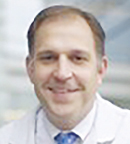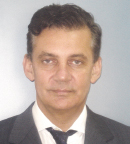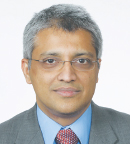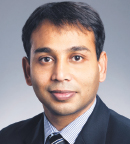
Kenneth Shain, MD, PhD
DARATUMUMAB APPEARS to be the “gift that keeps on giving” to the myeloma community. “It seems we can add daratumumab to almost anything and make the regimen better. It’s got good activity and a good safety profile,” said Kenneth Shain, MD, PhD, Director of the Myeloma Working Group at Moffitt Cancer Center, Tampa, who commented on the benefit observed by adding the monoclonal antibody to doublets and triplets in trials described at the 2018 American Society of Hematology (ASH) Annual Meeting & Exposition.
Griffin Trial in Transplant-Eligible Patients
IN PATIENTS with newly diagnosed myeloma eligible for autologous stem cell transplant (ASCT), the addition of daratumumab to a regimen of bortezomib, lenalidomide, and dexamethasone (D-VRd) was safe and more effective than VRd alone, with no additional safety concerns or negative effects on stem cell mobilization, in the ongoing phase II Griffin study reported by Peter M. Voorhees, MD, of the Levine Cancer Institute and Atrium Health in Charlotte, North Carolina.1

Peter M. Voorhees, MD
Griffin investigators hypothesized that the addition of daratumumab to a VRd backbone would improve the rate of high-quality responses in this patient setting. At the ASH meeting, Dr. Voorhees shared results from a safety run-in phase that assessed potential dose-limiting toxicities associated with D-VRd in 16 patients.
Patients received 4 induction cycles of VRd every 21 days, followed by stem cell mobilization, high-dose chemotherapy, and ASCT. They then received consolidation therapy with 2 cycles of daratumumab at 16 mg/kg plus VRd. Maintenance therapy consisted of lenalidomide and daratumumab.
With a median follow-up of 15.6 months, 15 of 16 patients (94%) remained on study treatment without disease progression. Response deepened over time, and by the end of consolidation, 100% of patients had achieved a very good partial response or better and 63% reached a complete or stringent complete response. Half the patients achieved minimal residual disease (MRD)-negative status, Dr. Voorhees noted. Three patients (19%) experienced a serious adverse event deemed related to daratumumab, but none resulted in discontinuation of treatment or death. Nonhematologic adverse events were mostly grade 1/2.
“It’s safe to say that we’re off to a good start,” he commented, noting that the combination was safe, and all patients underwent successful stem cell collection and engraftment. A large randomized phase II study of 222 transplant-eligible newly diagnosed patients has completed enrollment.
Trial Update in Transplant-Ineligible Patients
LONG-TERM RESULTS from the phase III ALYCONE trial have upheld the initial benefit shown for daratumumab plus bortezomib, melphalan, and prednisone (D-VMP). The study’s 706 patients received 9 cycles of VMP with or without daratumumab. Daratumumab was given at 16 mg/kg once weekly for cycle 1 and every 3 weeks for cycles 2 to 9, then continued every 4 weeks for additional cycles.2

Meletios A. Dimopoulos, MD
“With longer follow-up, the D-VMP regimen significantly improved progression-free survival and induced deep and durable responses that continued to improve on daratumumab monotherapy, including about a fourfold higher rate of MRD negativity, compared with VMP,” said Meletios A. Dimopoulos, MD, of National and Kapodistrian University of Athens, Greece.
At a median follow-up of 27.8 months—which is 1 year longer than the last report—the addition of daratumumab reduced the risk of disease progression or death by 57% (P < .0001). Median progression-free survival was not reached in daratumumab-treated patients but was 19.1 months with VMP. At 30 months, 60% and 28% of the cohorts, respectively, were progression-free. The updated analysis also revealed a deepening rate of MRD negativity: 27% with D-VMP vs 7% with VMP, with a lower risk of disease progression or death seen in all MRD-negative patients.
“Daratumumab plus VMP prolonged progression-free survival across all the subgroups we analyzed,” he said. “It also led to significantly higher overall response rates (91% vs 74%) and rates of very good partial response or better (73% vs 50%). Rates of complete response or better (45% vs 25%) and stringent complete responses (22% vs 8%) increased about twofold with D-VMP.”
The “progression-free survival 2” endpoint (the time from randomization to disease progression on first subsequent anticancer therapy or death) was also lengthened. Therefore, the investigators predict that overall survival will also be improved with D-VMP vs VMP.
Quadruplet Regimen

Shaji Kumar, MD
THE FIRST REPORTED results for daratumumab as part of a quadruplet regimen were presented by Shaji Kumar, MD, of the Mayo Clinic in Rochester.3
“Ixazomib, lenalidomide, and dexamethasone [IRd] is an effective, all-oral induction regimen that has been studied in phase II and phase III trials. We designed this trial to examine the feasibility and efficacy of adding daratumumab to the IRd regimen [IRd-Dara],” Dr. Kumar said. “Early results suggest excellent efficacy, with rapid responses that deepen quickly over the initial cycles of therapy. The regimen was well tolerated, with limited dose modifications, no discontinuation for toxicity, and no influence on the ability to collect stem cells.”
The study enrolled 40 newly diagnosed patients (though 1 cycle of prior therapy was allowed) to determine the rate of complete response to IRd-Dara. Treatment cycles of 28 days consisted of ixazomib at 4 mg on days 1, 8, and 15; lenalidomide at 25 mg on days 1 to 21; dexamethasone at 40 mg weekly; and daratumumab at 16 mg/kg weekly for 2 cycles, every other week during cycles 3 to 6, and then every 4 weeks thereafter. Patients continued on daratumumab and ixazomib for maintenance.
At data cutoff, 38 patients remained alive. Patients were followed a median of 10 months after receiving a median of 9 cycles of therapy. By the end of cycle 4, a very good partial response or better was observed in 39%, and 58% of patients had partial responses. The best response across all cycles was a very good partial response in 69%, with 19% achieving at least a complete response and only 1 patient not meeting criteria for response. The vast majority of patients showed a disappearance of measurable monoclonal protein, Dr. Kumar reported.
“There is a deepening of response with continued therapy among patients not going to transplant,” he said. He added that the complete response rate was lower than what would be expected, “partly because we switched to a mass spectrometry–based immunofixation [assessment] during the study, which is significantly more sensitive than standard immunofixation.”
Rates of dose reductions, modifications, and delays were “fairly low,” he said, citing 8% for ixazomib, 8% for daratumumab, 32% for lenalidomide, and 26% for dexamethasone. These regimen adjustments were mostly related to laboratory parameters or the use of steroids.
Grade ≥ 3 adverse events were seen in 58% of patients, with 18% being grade 4. As expected, the majority were hematologic, mostly cytopenias. Stem cell collection and engraftment were not compromised with this regimen, based on nine patients who continued to transplantation. The regimen was well tolerated, “despite the use of three different classes of drugs,” he noted.
A follow-up cohort is enrolling, and this next study will assess the discontinuation of dexamethasone after two cycles. Future trials will dissect the incremental benefit of adding a fourth drug and will assess the role of limited treatment duration, Dr. Kumar said. ■
DISCLOSURE: Dr. Shain reported financial relationships with Bristol-Myers Squibb, Amgen, Celgene, Novartis, Janssen, Takeda, AbbVie, and Adaptive. Dr. Voorhees reported financial relationships with Bristol-Myers Squibb, Amgen, Celgene, Novartis, and Janssen, which sponsored the study. Dr. Dimopoulos has received honoraria from and has consulted for Janssen, Takeda, Amgen, Bristol-Myers Squibb, and Celgene. Dr. Kumar is the principal investigator on clinical trials with research funding to the institution from Celgene, Takeda, Janssen, BMS, Sanofi, Kite, Merck, AbbVie, MedImmune, Novartis, Roche-Genentech, and Amgen; is a consultant/advisor (with no personal payments) for Celgene, Takeda, Janssen, Kite, Merck, AbbVie, MedImmune, Genentech, Amgen, and (with personal payment) from Oncopeptides, and Adaptive; and has received honorarium from Dr. Reddy’s Lab and Ono Pharmaceuticals.
REFERENCES
1. Voorhees PM, Rodriguez C, Reeves B, et al: Efficacy and updated safety analysis of a safety run-in cohort from Griffin, a phase 2 randomized study of daratumumab (Dara), bortezomib (V), lenalidomide (R), and dexamethasone (D; Dara‐VRd) vs VRd in patients with newly diagnosed multiple myeloma eligible for high‐dose therapy and autologous stem cell transplantation. 2018 ASH Annual Meeting & Exposition. Abstract 151. Presented December 1, 2018.
2. Dimopoulos M, Mateos M-V, Cavo M, et al: One-year update of a phase 3 randomized study of daratumumab plus bortezomib, melphalan and prednisone versus bortezomib, melphalan and prednisone in patients with transplant-ineligible newly diagnosed multiple myeloma: Alcyone. 2018 ASH Annual Meeting & Exposition. Abstract 156. Presented December 1, 2018.
3. Kumar SK, Kapoor P, Laplant B, et al: Phase 2 trial of ixazomib, lenalidomide, dexamethasone and daratumumab in patients with newly diagnosed multiple myeloma. 2018 ASH Annual Meeting & Exposition. Abstract 304. Presented December 2, 2018.


